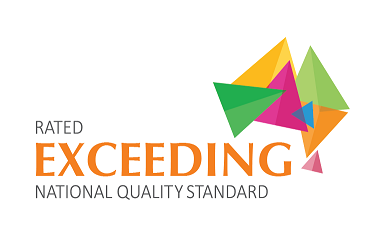Our Policies
- All policies relating to the service are available below.
- Our policies have been developed and adopted by the Bubup Womindjeka Family and Children’s Centre Board of Governance.
In order to assess whether the values and purposes of the policy have been achieved, the Board of Governance will:
- Regularly seek feedback from everyone affected by policies regarding the effectiveness of these policies.
- Monitor the implementation, compliance, complaints and incidents in relation to policies.
- keep policies up to date with current legislation, research, policy and best practice.
- Revise policies and procedures as part of the service’s policy review cycle, or as required.
- Notify families and staff 14 days before making any changes to a policy.
Quality Area 1 - Educational Program and Practice:
Quality Area 2 - Children's Health and Safety:
- P-Q2-B001 - Road Safety and Safe Transport Policy
- P-Q2-B002 - Supervision of Children Policy
- P-Q2-B003 - Oral Health Policy
- P-Q2-B004 - Tobacco, Alcohol and Other Drugs Policy
- P-Q2-M001 - Acceptance and Refusal of Authorisation
- P-Q2-M002 - Administration of First Aid Policy
- P-Q2-M003 - Anaphylaxis Policy
- P-Q2-M004 - Asthma Policy
- P-Q2-M005 - Relaxation and Sleep Policy
- P-Q2-M006 - Child Safe Environment Policy
- P-Q2-M007 - Dealing with Illness and Infectious Diseases Policy
- P-Q2-M008 - Dealing with Medical Conditions Policy
- P-Q2-M009 - Delivery and Collection of Children Policy
- P-Q2-M010 - Diabetes Policy
- P-Q2-M011 - Emergency and Evacuation Policy
- P-Q2-M012 - Excursions and Centre Events Policy
- P-Q2-M013 - Incident, Injury, Trauma and Illness Policy
- P-Q2-M014 - Nutrition and Active Play Policy
- P-Q2-M015 - Sun Protection Policy
- P-Q2-M017 - Administration of Medication Policy
- P-Q2-M018 - Epilepsy Policy
- P-Q2-M019 - Food Safety Policy
- P-Q2-M020 - Hygiene Policy
- P-Q2-M021 - Safe Use of Digital Technologies and Online Environments Policy
Quality Area 3 - Physical Environment:
Quality Area 4 - Staffing Arrangements:
Quality Area 5 - Relationships with Children:
Quality Area 6 - Collaborative Partnerships with Families and Communities:
Quality Area 7 - Leadership and Service Management:
- P-Q7-B001 - Information and Communication Technology (ICT) Policy
- P-Q7-B002 - Hardship Policy
- P-Q7-M001 - Complaints and Grievances Policy
- P-Q7-M002 - Fees Policy
- P-Q7-M003 - Governance and Management of the Service Policy
- P-Q7-M004 - Privacy and Confidentiality Policy
- P-Q7-S001 - Building and Equipment Maintenance Policy
- P-Q7-S002 - Whistleblower Policy
- P-Q7-S003 - Donations Policy




